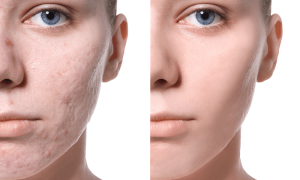 Although not harmful, acne scars can cause embarrassment, lower self-esteem and reduce quality of life. And while it may be impossible to completely remove deep acne scars, some treatments can significantly reduce their appearance. So, how does acne scar removal work? In this post, we’ll go over the various options for those who seek help with acne scarring.
Although not harmful, acne scars can cause embarrassment, lower self-esteem and reduce quality of life. And while it may be impossible to completely remove deep acne scars, some treatments can significantly reduce their appearance. So, how does acne scar removal work? In this post, we’ll go over the various options for those who seek help with acne scarring.
Laser Treatment For Acne Scar Removal
Laser treatment for acne scar removal aims to remove a fine layer of skin while stimulating the production of collagen and new skin cells. Scar tissue is broken up by the pulses of laser light which creates a new surface for skin cell growth. It’s important to remember that laser treatment won’t cause severe acne scars to completely disappear, but it can help to minimize their appearance and reduce any pain associated with them.
How Does Acne Scar Removal Work?
When undergoing laser treatment for acne scars, the heat and light emitted by the laser remove the top layer of skin. This includes scar tissue caused by cases of acne. The laser’s heat and concentrated light also stimulate the production of collagen and new skin cells. The result is shrinkage of blood vessels in the affected area, reduced inflammation and healing of the skin. Over time, the acne scars will become less noticeable.
Types Of Laser Treatment For Acne Removal
There are three main types of laser treatment for acne removal: ablative, non-ablative and fractionated. Ablative laser resurfacing removes the top layer of skin. Non-ablative resurfacing stimulates collagen production. Fractionated lasers reduce dark pigmentation caused by acne scars.
Acne Scar Removal Preparations
Your dermatologist will give you personalized instructions to help prepare for your treatment, but you should expect to be told to avoid taking any blood-thinning medications or using retinol-based skincare products. You’ll also need to avoid smoking for at least two weeks before your session.
Post Treatment Expectations
You’ll need to take special care of your skin for several weeks after treatment. Avoiding prolonged exposure to direct sunlight and using sunscreen are musts. You’ll be prescribed moisturizers and possibly other skincare products. You may experience redness as your skin heals. You should begin to see positive results after a week or so of healing.
 Leeza has been operating a hair removal business since 1987, starting with electrolysis services and then evolving to laser hair removal and laser skin treatments. Being aware of the many different types of laser hair removal technologies available, her method of choosing a successful product was to personally undergo the procedure herself...
Leeza has been operating a hair removal business since 1987, starting with electrolysis services and then evolving to laser hair removal and laser skin treatments. Being aware of the many different types of laser hair removal technologies available, her method of choosing a successful product was to personally undergo the procedure herself...